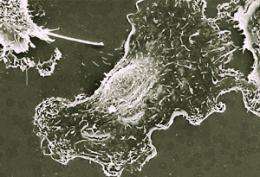In cancer, molecular signals that recruit blood vessels also trigger metastasis

(Medical Xpress) -- Cancer cells are most deadly when they’re on the move — able not only to destroy whatever organ they are first formed in, but also to create colonies elsewhere in the body. New research has now shown how a small RNA prevents the recruitment and formation of blood vessels near cancer cell destined to become metastases, a process that must occur in order for them to grow. The scientists say that if drugs could be developed that act on the pathways regulated by this microRNA, they might be able to block the metastatic process and prevent some breast cancers from becoming deadly.
“Metastatic cancer cells have the ability to recruit blood vessel cells — they send out multiple signals that cause endothelial cells to arrive at the incipient metastatic site,” says the study’s senior author, Sohail Tavazoie, head of the Elizabeth and Vincent Meyer Laboratory of Systems Cancer Biology. “Our new work shows that a microRNA known as miR-126 blocks metastasis by suppressing several genes that promote this process. These genes both increase blood vessels and trigger metastasis.”
MiR-126 is one of three microRNAs that Tavazoie and his colleagues had previously identified as being linked to breast cancer metastasis. In work he published in 2008, Tavazoie established that miR-126 acts as a metastasis suppressor in mice, and found that breast cancer patients whose tumors contained very low levels of miR-126 had a much higher likelihood of having their cancer spread than did patients with higher levels of miR-126.
The new work suggests that blood vessel cells are a major reason why. Working with human tumor cells in vitro, as well as with mice, first authors Kim Png, a graduate student, and Nils Halberg, a postdoctoral fellow, found that miR126 blocks three novel cancer genes, known as IGFBP2, MERTK and PITPNC1. Although each of the genes works on distinct pathways discovered by this group, the results are the same: more endothelial cells and increased blood vessel formation in the metastases.
But what’s most remarkable about the results, the researchers say, is what happens after the blood vessels form. The team’s experiments show that enhanced expression of these genes increases metastasis in mice. And when they went further, testing clinical samples of human tumors for expression of the three genes, they found a clear correlation: patients whose tumors had higher expression of these genes were more prone to relapse.
“The endothelial cells aren’t just providing blood flow to the cancer cells,” Tavazoie says, “they are somehow triggering the metastatic process, providing a signal back to the cancer cells that allows them to initiate metastatic colonies. Our work reveals a novel and non-canonical role for blood vessel cells in cancer biology, and one that we need to better understand in order to rationally target and prevent metastasis.”
More information: Nature online: December 14, 2011, A microRNA regulon that mediates endothelial recruitment and metastasis by cancer cells, Kim J. Png, et al.













